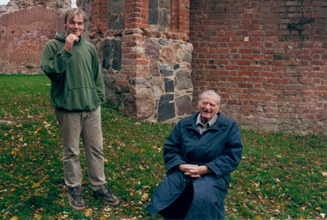Uckermark
Volker Koepp
Deutschland 2001 |
| |
|
 |
|
|
Delphi
09.02., 16.45
CinemaxX 3
10.02,. 16.15
Arsenal 1
10.02,. 22.15
Babylon
11.02., 13.00
|
|
|
|
|
Produktion: Vineta Film mit SWR, WDR, ORB
Weltvertrieb: Vineta Film
Elisabethweg 6a, D-13187 Berlin
Tel.: (49-30) 4863 8966, Fax: 4863 8968
e-mail: vinetafilm@t-online.de
Buch: Volker Koepp
Kamera: Thomas Plenert
Ton: Matthias Pfister
Musik: Rainer Böhm
Schnitt: Angelika Arnold
Format: 35 mm, 1:1.66, Farbe
Länge: 105 Minuten, 24 Bilder/Sek.
Sprache: deutsch |
|
|
|
|
Die Uckermark, nur sechzig Kilometer von Berlin entfernt, nord-östlich
an Vorpommern und Polen grenzend, ist heute der
größte deutsche Landkreis und zugleich die am dünnsten
besiedelte
Gegend in Deutschland. Der Epochenriss geht mitten
durch diese Region und ihre Menschen. Vor dem Zweiten
Weltkrieg waren die meisten landwirtschaftlichen Betriebe hier
im Besitz des seit Generationen ansässigen Landadels. In der
DDR wurden die Güter enteignet und zu Produktionsgenossenschaften
umgewandelt. Seit der Wende werden nur noch wenige
Menschen in der Landwirtschaft gebraucht. Große Flächen
wurden deshalb zu Nationalparks und Naturschutzreservaten erklärt.
Mehr als zwanzig Prozent der Bevölkerung ist arbeitslos:
Die Uckermark zählt zu den ärmsten Regionen Deutschlands.
Volker Koepp ist nach Herr Zwilling und Frau Zuckermann und
Kurische Nehrung wieder in die Mark Brandenburg zurückgekehrt,
in der eine Vielzahl seiner Filme entstanden ist. In Uckermark
beschreibt er das Nebeneinander der Zeiten anhand von Erzählungen
und Lebensgeschichten: von Bauern und zurückgekehrtem
Adel, von Menschen, die über kurzfristige Beschäftigungsmaßnahmen
nach sinnvoller Arbeit suchen. Ein
Theatermann (Fritz Marquardt) erinnert sich an Vergangenes.
Wie auf einer Bühne versammelt der Film eine kleine Schar von
Übriggebliebenen und Heimkehrern der Nachwendezeit. Er zeigt
sie bisweilen skurril und tragikomisch, manchmal melancholisch
und von trotzigem Idealismus. Ansgar Vogt
|
| |
|
|
Lying just sixty kilometres from Berlin and
bordering to the north-east with West
Pomerania and Poland, the Uckermark is
currently Germany’s largest district. In
terms of surface area, it is larger than the
state of Saarland, yet it is the most sparsely
populated area of Germany. The epochal
schism tore right through the region and
its people. Until the Second World War,
most of the farms remained in the hands of
the local landed gentry for generations.
Under communism, East Germany’s estates
were expropriated and transformed into co-operatives
in which the majority of the
population worked then. Modern agricultural
methods need little manpower. Large
tracts have been declared national parks or
nature reserves. More than 20 percent of
the population is unemployed. The Uckermark
is seen as one of the poorest regions
in Germany. Anyone who still hopes to find
work elsewhere moves away.
Following on from his films Mr Zwilling and
Ms Zuckermann and Curonian Spit, Volker
Koepp returns to the Brandenburg Marches,
where many of his films were made.
Uckermark describes the coexistence of the
various eras using the stories and lives of
the local people. They are farmers and returning
noblemen, men and women hoping
that short-term job-creation schemes will
lead to meaningful work, a theatre director
whom the Uckermark reminds of the past.
As if on a stage, the film gathers together
a small group of stragglers and post-Wall
returnees. They are occasionally droll or
tragicomic, sometimes melancholy and
filled with stubborn idealism.
Ansgar Vogt
|
| |
|
Biographien / Biographies
Volker Koepp, geb. 1944 in Stettin. Nach dem Filmstudium Regisseur am DEFA-Studio
für Dokumentarfilm. Filme seit 1971, im Forum u.a. Wittstock, Wittstock
(1997), Herr Zwilling und Frau Zuckermann (1999), Kurische Nehrung (2001).
|
